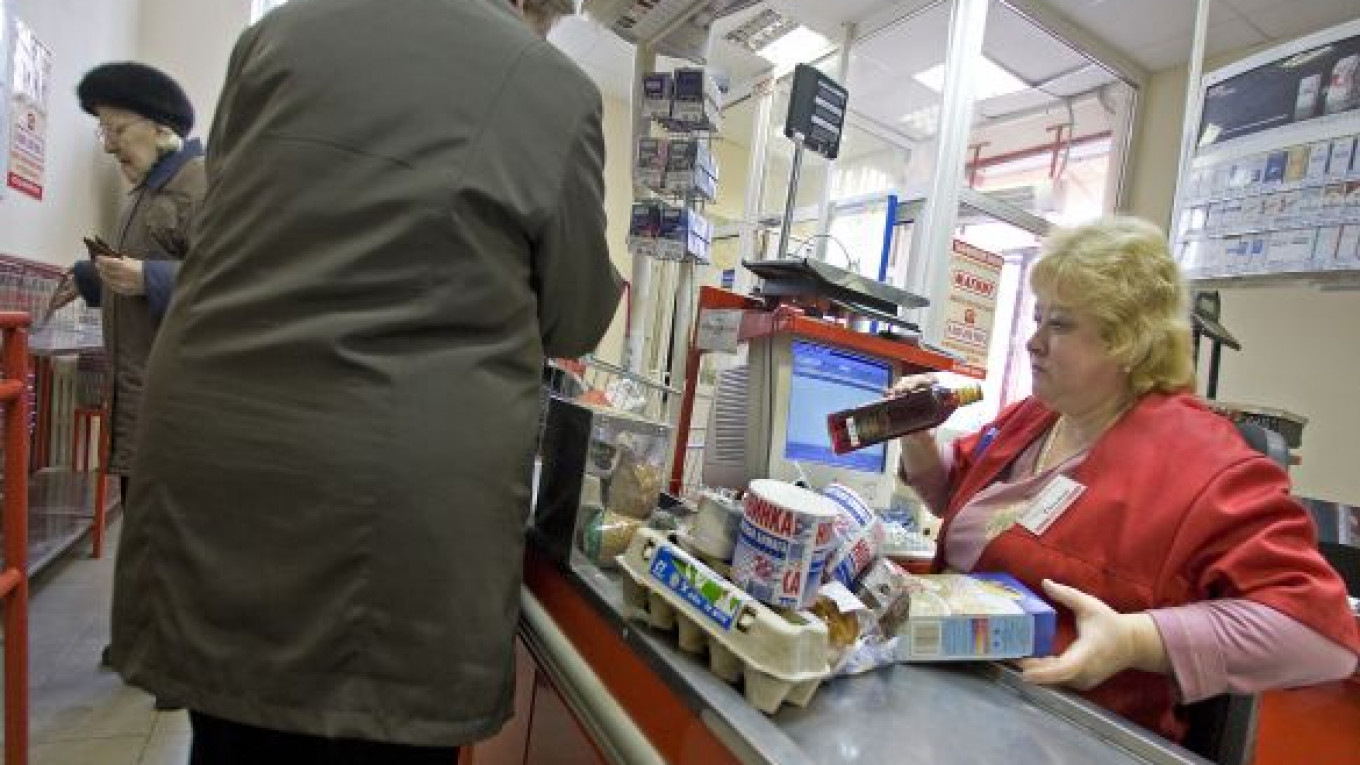Fast-growing grocer Magnit ratcheted up its sales growth forecast for the second time in a month and raised capital expenditure guidance to keep pace with recovering demand.
"Forty-nine percent growth, I think we can say already today, is the low end of our forecast," chief executive Sergei Galitsky said on a conference call with analysts Friday.
Russia's biggest food retailer by number of stores set its forecast for 2011 growth in rubles at 36 percent earlier this month, anticipating a likely surge in consumer spending.
Galitsky said the company saw "fantastic" like-for-like sales growth in the first two months of this year &mdash 18 percent in January and 22 percent in February — as it continued to keep prices low despite increased social tax and fuel prices.
"We want to be aggressive on our price offer and growth because to come close to exceeding last year's [sales growth] level is an interesting task for 2011. We are very optimistic in our expectations," he said.
Magnit's Moscow-listed shares closed 0.5 percent higher, in line with a 0.67 percent rise in the broader market.
Both Magnit and archrival X5 are in the midst of a major store opening campaign to take advantage of economic growth and the emergence of a middle class that spends more on food and other consumer goods.
Galitsky forecast investments in store openings, upgrades and transport to come in at $1.8 billion, up from the earlier expected $1.5 billion, as it plans to open between 800 and 1,000 stores in 2011 and renovate hundreds of old outlets.
Magnit's capex totaled a record $1.2 billion in 2010, which led to a rise in net debt to EBITDA ratio. Galitsky said the ratio would rise further from 1.38 in 2010 but remain below 2.0.
"The company by far outperformed the food retail market in Russia, as well as the top global retailers in terms of revenue growth. Magnit's business model and ability to expand into high-growth regions remains the best in the Russian retail market," UralSib analysts wrote in a note.
In 2010, the company's like-for-like sales grew 9.19 percent in ruble terms, with traffic — or the number of customers visiting its stores — up 3.03 percent and the average ticket price of goods sold up 5.97 percent.
Fast chain expansion added to the better same-store performance, resulting in 39 percent ruble sales growth in 2010 as Magnit opened 827 stores, increasing selling space by 34 percent. In dollars, revenue jumped 45 percent to $7.8 billion.
Galitsky, who is also the controlling shareholder of Magnit, said increased capex was likely to affect earnings before interest, taxation, depreciation and amortization as it will take some time for newly opened stores to mature.
He said the EBITDA margin was likely to hover near an 8 percent level in the long run. The 2011 forecast revealed earlier suggested the margin will fall to 7.5 to 8 percent from 8.12 percent in 2010 after an increase in social tax and price cuts as Magnit seeks to attract customers into its stores.
"We believe that this should be interpreted as a reinforced commitment to having the best prices on the market, as the increased social burden will not be passed on to customers. In the long run, this should put more pressure on smaller rivals and encourage faster LFL sales growth," Troika analysts said.
In 2010, the margin fell from 9.5 percent in 2009 because of a spike in fuel costs in the final quarter and an increase of the number of stores included in the renovation program.
Full-year net profit rose 21 percent to $333.7 million, Magnit said in an earlier statement, coming in below an average forecast of $339.1 million, but within a $315 million to $353.4 million range in a Reuters poll.
A Message from The Moscow Times:
Dear readers,
We are facing unprecedented challenges. Russia's Prosecutor General's Office has designated The Moscow Times as an "undesirable" organization, criminalizing our work and putting our staff at risk of prosecution. This follows our earlier unjust labeling as a "foreign agent."
These actions are direct attempts to silence independent journalism in Russia. The authorities claim our work "discredits the decisions of the Russian leadership." We see things differently: we strive to provide accurate, unbiased reporting on Russia.
We, the journalists of The Moscow Times, refuse to be silenced. But to continue our work, we need your help.
Your support, no matter how small, makes a world of difference. If you can, please support us monthly starting from just $2. It's quick to set up, and every contribution makes a significant impact.
By supporting The Moscow Times, you're defending open, independent journalism in the face of repression. Thank you for standing with us.
Remind me later.






